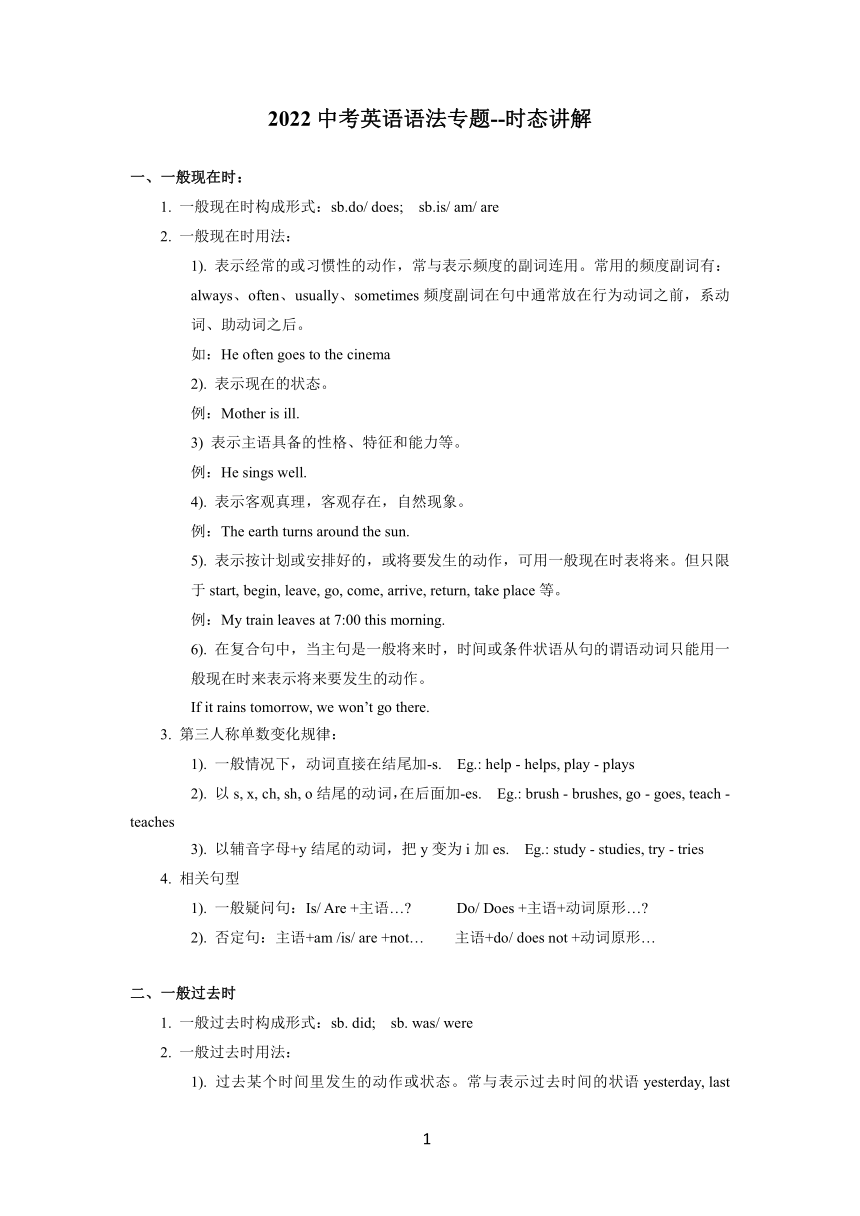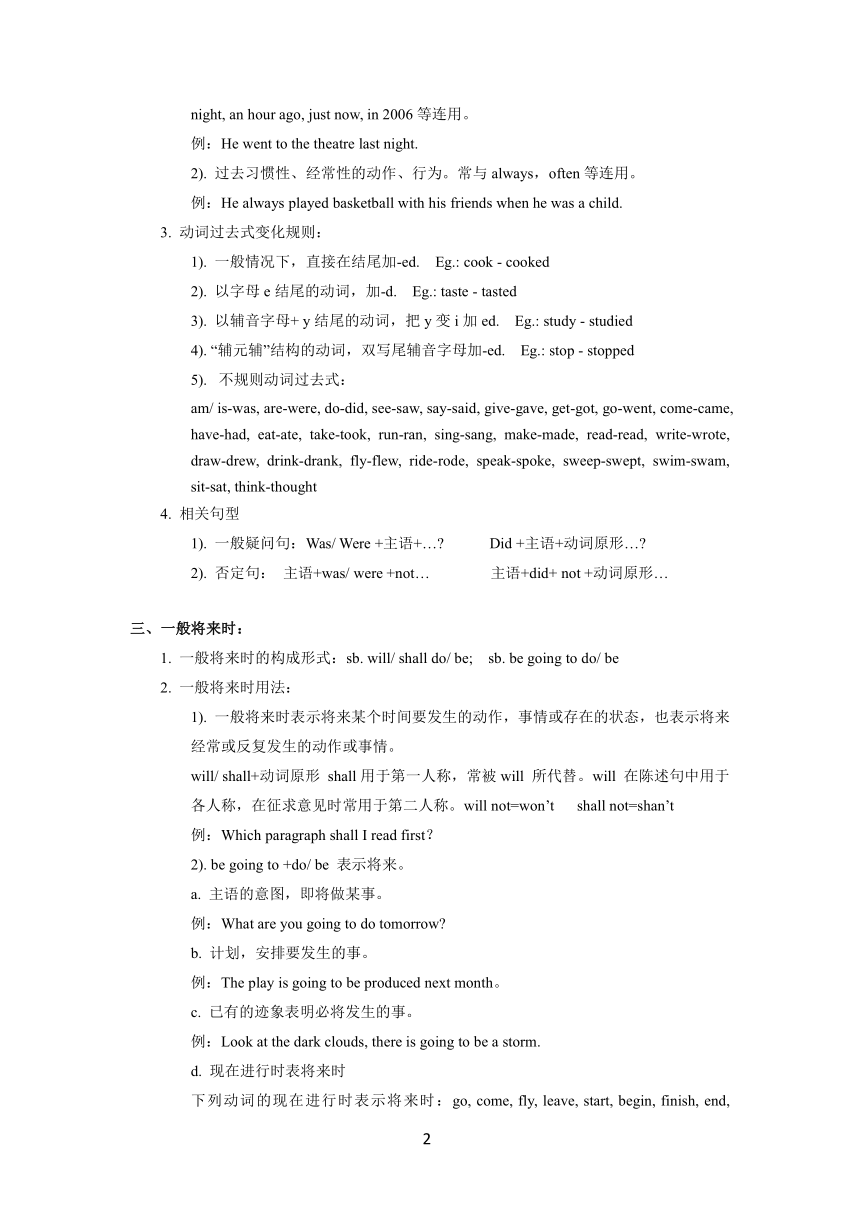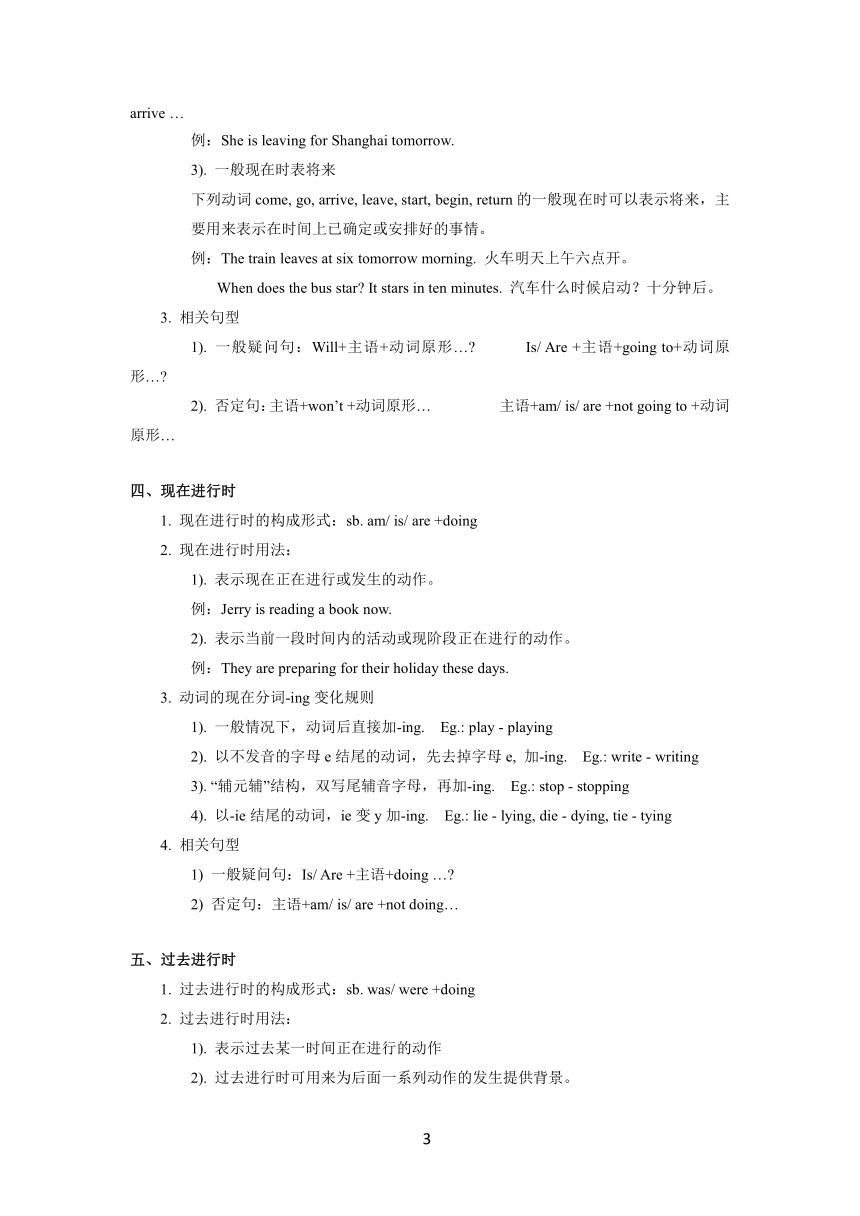2022年中考英语语法专题--时态讲解
图片预览



文档简介
2022中考英语语法专题--时态讲解
一、一般现在时:
1. 一般现在时构成形式:sb.do/ does; sb.is/ am/ are
2. 一般现在时用法:
1). 表示经常的或习惯性的动作,常与表示频度的副词连用。常用的频度副词有: always、often、usually、sometimes频度副词在句中通常放在行为动词之前,系动词、助动词之后。
如:He often goes to the cinema
2). 表示现在的状态。
例:Mother is ill.
3) 表示主语具备的性格、特征和能力等。
例:He sings well.
4). 表示客观真理,客观存在,自然现象。
例:The earth turns around the sun.
5). 表示按计划或安排好的,或将要发生的动作,可用一般现在时表将来。但只限于start, begin, leave, go, come, arrive, return, take place等。
例:My train leaves at 7:00 this morning.
6). 在复合句中,当主句是一般将来时,时间或条件状语从句的谓语动词只能用一般现在时来表示将来要发生的动作。
If it rains tomorrow, we won’t go there.
3. 第三人称单数变化规律:
1). 一般情况下,动词直接在结尾加-s. Eg.: help - helps, play - plays
2). 以s, x, ch, sh, o结尾的动词,在后面加-es. Eg.: brush - brushes, go - goes, teach - teaches
3). 以辅音字母+y结尾的动词,把y变为i加es. Eg.: study - studies, try - tries
4. 相关句型
1). 一般疑问句:Is/ Are +主语… Do/ Does +主语+动词原形…
2). 否定句:主语+am /is/ are +not… 主语+do/ does not +动词原形…
二、一般过去时
1. 一般过去时构成形式:sb. did; sb. was/ were
2. 一般过去时用法:
1). 过去某个时间里发生的动作或状态。常与表示过去时间的状语yesterday, last night, an hour ago, just now, in 2006等连用。
例:He went to the theatre last night.
2). 过去习惯性、经常性的动作、行为。常与always,often等连用。
例:He always played basketball with his friends when he was a child.
3. 动词过去式变化规则:
1). 一般情况下,直接在结尾加-ed. Eg.: cook - cooked
2). 以字母e结尾的动词,加-d. Eg.: taste - tasted
3). 以辅音字母+ y结尾的动词,把y变i加ed. Eg.: study - studied
4). “辅元辅”结构的动词,双写尾辅音字母加-ed. Eg.: stop - stopped
5). 不规则动词过去式:
am/ is-was, are-were, do-did, see-saw, say-said, give-gave, get-got, go-went, come-came, have-had, eat-ate, take-took, run-ran, sing-sang, make-made, read-read, write-wrote, draw-drew, drink-drank, fly-flew, ride-rode, speak-spoke, sweep-swept, swim-swam, sit-sat, think-thought
4. 相关句型
1). 一般疑问句:Was/ Were +主语+… Did +主语+动词原形…
2). 否定句: 主语+was/ were +not… 主语+did+ not +动词原形…
三、一般将来时:
1. 一般将来时的构成形式:sb. will/ shall do/ be; sb. be going to do/ be
2. 一般将来时用法:
1). 一般将来时表示将来某个时间要发生的动作,事情或存在的状态,也表示将来经常或反复发生的动作或事情。
will/ shall+动词原形 shall用于第一人称,常被will 所代替。will 在陈述句中用于各人称,在征求意见时常用于第二人称。will not=won’t shall not=shan’t
例:Which paragraph shall I read first?
2). be going to +do/ be 表示将来。
a. 主语的意图,即将做某事。
例:What are you going to do tomorrow
b. 计划,安排要发生的事。
例:The play is going to be produced next month。
c. 已有的迹象表明必将发生的事。
例:Look at the dark clouds, there is going to be a storm.
d. 现在进行时表将来时
下列动词的现在进行时表示将来时:go, come, fly, leave, start, begin, finish, end, arrive …
例:She is leaving for Shanghai tomorrow.
3). 一般现在时表将来
下列动词come, go, arrive, leave, start, begin, return的一般现在时可以表示将来,主要用来表示在时间上已确定或安排好的事情。
例:The train leaves at six tomorrow morning. 火车明天上午六点开。
When does the bus star It stars in ten minutes. 汽车什么时候启动?十分钟后。
3. 相关句型
1). 一般疑问句:Will+主语+动词原形… Is/ Are +主语+going to+动词原形…
2). 否定句:主语+won’t +动词原形… 主语+am/ is/ are +not going to +动词原形…
四、现在进行时
1. 现在进行时的构成形式:sb. am/ is/ are +doing
2. 现在进行时用法:
1). 表示现在正在进行或发生的动作。
例:Jerry is reading a book now.
2). 表示当前一段时间内的活动或现阶段正在进行的动作。
例:They are preparing for their holiday these days.
3. 动词的现在分词-ing变化规则
1). 一般情况下,动词后直接加-ing. Eg.: play - playing
2). 以不发音的字母e结尾的动词,先去掉字母e, 加-ing. Eg.: write - writing
3). “辅元辅”结构,双写尾辅音字母,再加-ing. Eg.: stop - stopping
4). 以-ie结尾的动词,ie变y加-ing. Eg.: lie - lying, die - dying, tie - tying
4. 相关句型
1) 一般疑问句:Is/ Are +主语+doing …
2) 否定句:主语+am/ is/ are +not doing…
五、过去进行时
1. 过去进行时的构成形式:sb. was/ were +doing
2. 过去进行时用法:
1). 表示过去某一时间正在进行的动作
2). 过去进行时可用来为后面一系列动作的发生提供背景。
3. 相关句型
1). 一般疑问句:was/ were+主语+doing?
2). 否定句:主语+was/ were not + doing
六、现在完成时
1. 现在完成时的构成形式:sb. have/ has done
2. 现在完成时用法:
1). 表示过去发生的或已经完成的某一动作对现在造成的影响或结果。
2). 表示动作或状态在过去已经开始并持续到现在,也许还持续下去,常和for, since连用。
3. 动词过去分词变化规律:
1). 一般情况下,直接在动词词尾加ed
2). 以字母“e”结尾的动词,在词尾加d
3). 以辅音字母+ y结尾的动词,将y变成 i 再加ed
4). 重读闭音节结尾,末尾只有一个辅音字母,双写辅音字母,再加ed
5). 其他不规则变化
4. 相关句型
1) 一般疑问句:Have/ Has +主语+done…
2) 否定句:主语+have/ has + not +done…
七、过去完成时
1. 过去完成时的构成形式:sb. had done
2. 过去完成时用法:
1). 过去完成时表示在过去某一时间或动作以前已经完成了的动作。这个过去的时间常用by, before等介词短语或一个时间状语从句表示,也可以暗含在上下文中。
2). 过去完成时还可表示过去某一时刻之前发生的动作或状态持续到过去某个时间或还要持续下去,常与for, since等词连用。
3). 在一段情景连贯的文字中,先发生的事放在后面叙述时,要用过去完成时。
3. 相关句型
1). 一般疑问句:Had+主语+done…
2). 否定句:主语+had + not +done…
巩固练习:
例1.1.1用所给动词的适当形式填空。
1. His name _________ John. He _________ a Middle school student.
2. They _________ (go) to the park last Sunday.
3. Lily __________(stay) with me tonight.
4. Listen! Someone _________ (cry) in the next room.
5. They _________ (watch) a football match from 7:00 to 9:00 last night.
6. I _________ already _________ (study) in this school for three years.
7. On returning home, I found I _________ (leave) my umbrella in the office.
例1.2.1He ________ very busy today, he ________ free next week.
A. will be; is
B. is; is
C. will be; will be
D. is; will be
例1.2.2Don’t make any noise. The teachers _________ a meeting.
A. are having B. is having
C. have D. will have
例1.2.3They _________ a computer for two years.
A. buy B. have bought
C. bought D. will buy
随堂练习:
随练1.1用所给动词的适当形式填空。
1. There _________ (be) some magazines on the table.
2. Who _________ (break) the window just now
3. We __________(visit) our teacher next Sunday.
4. Wei Fang is ill. She _________ (stay) in bed now.
5. He _________ (try) to draw a plane on the blackboard at that time.
6. I _________ (find) my pencil yet.
7. By the time my parents reached home yesterday, I _________ (cook) the dinner already.
随练1.2Danny _________ English, Chinese, Math, Science and Art at school from Monday to Friday.
A. study B. studys
C. studies D. studied
随练1.3There _________ a birthday party this Sunday.
A. shall be
B. shall going to be
C. will be
D. will going to be
随练1.4I _________ my homework yesterday.
A. finished B. would finish
C. was finishing D. finish
随练1.5--- _________ you finish the homework last night
--- No, I _________ it now.
A. Did; am doing B. Do; am doing
C. Did; was doing D. Were; do
随练1.6What _________ you _________ from nine to eleven yesterday evening
A. was; doing B. are; doing
C. were; doing D. is; doing
随练1.7How long have you _________ a student
A. be B. do C. are D. been
随练1.8I _________ already_________ in this school for three years.
A. was; studying B. are; studying
C. will; study D. have; studied
随练1.9Lucy told me that her sister _________ to the bank when I arrived.
A. had just been B. had just gone
C. has just been D. has just gone
课后作业:
作业1用所给动词的适当形式填空。
1. What _________ in your bag _________ there some food in it
2. His father _________ (get) a letter from his sister last week.
3. She _________ (come) here soon.
4. ---What _________ they _________ (do) now
---They _________ (climb) the hill.
5. While she _________ (watch) TV, her son _________ (play) outside at that time yesterday.
6. I _________ (learn) English since 2010.
7. They _________ (not know) each other before they got married.
作业2Sophia _________ in her sister’s house now, but she _________ move into her new house in two years.
A. lived; will B. lives; want to
C. lives; wants D. lives; will
作业3Sometimes his brother _________ TV after supper.
A. watches B. sees
C. looks D. is watching
作业4He _________ his umbrella to me yesterday. So I didn’t get wet.
A. borrowed B. kept
C. lent D. bought
作业5Don’t talk here! Your father _________.
A. sleep B. is sleeping
C. sleeping D. was sleeping
作业6At this moment yesterday, I _________ an article.
A. was writing B. write
C. wrote D. is writing
作业7He _________ English for three years since he came to the USA.
A. speaks B. spoke
C. is speaking D. has spoken
作业8The party _________ before he arrived.
A. begin B. began
C. had begun D. has begun
作业9Mr. Brown isn’t at home. He _________ to his office.
A. has been B. has gone
C. go D. went
1
一、一般现在时:
1. 一般现在时构成形式:sb.do/ does; sb.is/ am/ are
2. 一般现在时用法:
1). 表示经常的或习惯性的动作,常与表示频度的副词连用。常用的频度副词有: always、often、usually、sometimes频度副词在句中通常放在行为动词之前,系动词、助动词之后。
如:He often goes to the cinema
2). 表示现在的状态。
例:Mother is ill.
3) 表示主语具备的性格、特征和能力等。
例:He sings well.
4). 表示客观真理,客观存在,自然现象。
例:The earth turns around the sun.
5). 表示按计划或安排好的,或将要发生的动作,可用一般现在时表将来。但只限于start, begin, leave, go, come, arrive, return, take place等。
例:My train leaves at 7:00 this morning.
6). 在复合句中,当主句是一般将来时,时间或条件状语从句的谓语动词只能用一般现在时来表示将来要发生的动作。
If it rains tomorrow, we won’t go there.
3. 第三人称单数变化规律:
1). 一般情况下,动词直接在结尾加-s. Eg.: help - helps, play - plays
2). 以s, x, ch, sh, o结尾的动词,在后面加-es. Eg.: brush - brushes, go - goes, teach - teaches
3). 以辅音字母+y结尾的动词,把y变为i加es. Eg.: study - studies, try - tries
4. 相关句型
1). 一般疑问句:Is/ Are +主语… Do/ Does +主语+动词原形…
2). 否定句:主语+am /is/ are +not… 主语+do/ does not +动词原形…
二、一般过去时
1. 一般过去时构成形式:sb. did; sb. was/ were
2. 一般过去时用法:
1). 过去某个时间里发生的动作或状态。常与表示过去时间的状语yesterday, last night, an hour ago, just now, in 2006等连用。
例:He went to the theatre last night.
2). 过去习惯性、经常性的动作、行为。常与always,often等连用。
例:He always played basketball with his friends when he was a child.
3. 动词过去式变化规则:
1). 一般情况下,直接在结尾加-ed. Eg.: cook - cooked
2). 以字母e结尾的动词,加-d. Eg.: taste - tasted
3). 以辅音字母+ y结尾的动词,把y变i加ed. Eg.: study - studied
4). “辅元辅”结构的动词,双写尾辅音字母加-ed. Eg.: stop - stopped
5). 不规则动词过去式:
am/ is-was, are-were, do-did, see-saw, say-said, give-gave, get-got, go-went, come-came, have-had, eat-ate, take-took, run-ran, sing-sang, make-made, read-read, write-wrote, draw-drew, drink-drank, fly-flew, ride-rode, speak-spoke, sweep-swept, swim-swam, sit-sat, think-thought
4. 相关句型
1). 一般疑问句:Was/ Were +主语+… Did +主语+动词原形…
2). 否定句: 主语+was/ were +not… 主语+did+ not +动词原形…
三、一般将来时:
1. 一般将来时的构成形式:sb. will/ shall do/ be; sb. be going to do/ be
2. 一般将来时用法:
1). 一般将来时表示将来某个时间要发生的动作,事情或存在的状态,也表示将来经常或反复发生的动作或事情。
will/ shall+动词原形 shall用于第一人称,常被will 所代替。will 在陈述句中用于各人称,在征求意见时常用于第二人称。will not=won’t shall not=shan’t
例:Which paragraph shall I read first?
2). be going to +do/ be 表示将来。
a. 主语的意图,即将做某事。
例:What are you going to do tomorrow
b. 计划,安排要发生的事。
例:The play is going to be produced next month。
c. 已有的迹象表明必将发生的事。
例:Look at the dark clouds, there is going to be a storm.
d. 现在进行时表将来时
下列动词的现在进行时表示将来时:go, come, fly, leave, start, begin, finish, end, arrive …
例:She is leaving for Shanghai tomorrow.
3). 一般现在时表将来
下列动词come, go, arrive, leave, start, begin, return的一般现在时可以表示将来,主要用来表示在时间上已确定或安排好的事情。
例:The train leaves at six tomorrow morning. 火车明天上午六点开。
When does the bus star It stars in ten minutes. 汽车什么时候启动?十分钟后。
3. 相关句型
1). 一般疑问句:Will+主语+动词原形… Is/ Are +主语+going to+动词原形…
2). 否定句:主语+won’t +动词原形… 主语+am/ is/ are +not going to +动词原形…
四、现在进行时
1. 现在进行时的构成形式:sb. am/ is/ are +doing
2. 现在进行时用法:
1). 表示现在正在进行或发生的动作。
例:Jerry is reading a book now.
2). 表示当前一段时间内的活动或现阶段正在进行的动作。
例:They are preparing for their holiday these days.
3. 动词的现在分词-ing变化规则
1). 一般情况下,动词后直接加-ing. Eg.: play - playing
2). 以不发音的字母e结尾的动词,先去掉字母e, 加-ing. Eg.: write - writing
3). “辅元辅”结构,双写尾辅音字母,再加-ing. Eg.: stop - stopping
4). 以-ie结尾的动词,ie变y加-ing. Eg.: lie - lying, die - dying, tie - tying
4. 相关句型
1) 一般疑问句:Is/ Are +主语+doing …
2) 否定句:主语+am/ is/ are +not doing…
五、过去进行时
1. 过去进行时的构成形式:sb. was/ were +doing
2. 过去进行时用法:
1). 表示过去某一时间正在进行的动作
2). 过去进行时可用来为后面一系列动作的发生提供背景。
3. 相关句型
1). 一般疑问句:was/ were+主语+doing?
2). 否定句:主语+was/ were not + doing
六、现在完成时
1. 现在完成时的构成形式:sb. have/ has done
2. 现在完成时用法:
1). 表示过去发生的或已经完成的某一动作对现在造成的影响或结果。
2). 表示动作或状态在过去已经开始并持续到现在,也许还持续下去,常和for, since连用。
3. 动词过去分词变化规律:
1). 一般情况下,直接在动词词尾加ed
2). 以字母“e”结尾的动词,在词尾加d
3). 以辅音字母+ y结尾的动词,将y变成 i 再加ed
4). 重读闭音节结尾,末尾只有一个辅音字母,双写辅音字母,再加ed
5). 其他不规则变化
4. 相关句型
1) 一般疑问句:Have/ Has +主语+done…
2) 否定句:主语+have/ has + not +done…
七、过去完成时
1. 过去完成时的构成形式:sb. had done
2. 过去完成时用法:
1). 过去完成时表示在过去某一时间或动作以前已经完成了的动作。这个过去的时间常用by, before等介词短语或一个时间状语从句表示,也可以暗含在上下文中。
2). 过去完成时还可表示过去某一时刻之前发生的动作或状态持续到过去某个时间或还要持续下去,常与for, since等词连用。
3). 在一段情景连贯的文字中,先发生的事放在后面叙述时,要用过去完成时。
3. 相关句型
1). 一般疑问句:Had+主语+done…
2). 否定句:主语+had + not +done…
巩固练习:
例1.1.1用所给动词的适当形式填空。
1. His name _________ John. He _________ a Middle school student.
2. They _________ (go) to the park last Sunday.
3. Lily __________(stay) with me tonight.
4. Listen! Someone _________ (cry) in the next room.
5. They _________ (watch) a football match from 7:00 to 9:00 last night.
6. I _________ already _________ (study) in this school for three years.
7. On returning home, I found I _________ (leave) my umbrella in the office.
例1.2.1He ________ very busy today, he ________ free next week.
A. will be; is
B. is; is
C. will be; will be
D. is; will be
例1.2.2Don’t make any noise. The teachers _________ a meeting.
A. are having B. is having
C. have D. will have
例1.2.3They _________ a computer for two years.
A. buy B. have bought
C. bought D. will buy
随堂练习:
随练1.1用所给动词的适当形式填空。
1. There _________ (be) some magazines on the table.
2. Who _________ (break) the window just now
3. We __________(visit) our teacher next Sunday.
4. Wei Fang is ill. She _________ (stay) in bed now.
5. He _________ (try) to draw a plane on the blackboard at that time.
6. I _________ (find) my pencil yet.
7. By the time my parents reached home yesterday, I _________ (cook) the dinner already.
随练1.2Danny _________ English, Chinese, Math, Science and Art at school from Monday to Friday.
A. study B. studys
C. studies D. studied
随练1.3There _________ a birthday party this Sunday.
A. shall be
B. shall going to be
C. will be
D. will going to be
随练1.4I _________ my homework yesterday.
A. finished B. would finish
C. was finishing D. finish
随练1.5--- _________ you finish the homework last night
--- No, I _________ it now.
A. Did; am doing B. Do; am doing
C. Did; was doing D. Were; do
随练1.6What _________ you _________ from nine to eleven yesterday evening
A. was; doing B. are; doing
C. were; doing D. is; doing
随练1.7How long have you _________ a student
A. be B. do C. are D. been
随练1.8I _________ already_________ in this school for three years.
A. was; studying B. are; studying
C. will; study D. have; studied
随练1.9Lucy told me that her sister _________ to the bank when I arrived.
A. had just been B. had just gone
C. has just been D. has just gone
课后作业:
作业1用所给动词的适当形式填空。
1. What _________ in your bag _________ there some food in it
2. His father _________ (get) a letter from his sister last week.
3. She _________ (come) here soon.
4. ---What _________ they _________ (do) now
---They _________ (climb) the hill.
5. While she _________ (watch) TV, her son _________ (play) outside at that time yesterday.
6. I _________ (learn) English since 2010.
7. They _________ (not know) each other before they got married.
作业2Sophia _________ in her sister’s house now, but she _________ move into her new house in two years.
A. lived; will B. lives; want to
C. lives; wants D. lives; will
作业3Sometimes his brother _________ TV after supper.
A. watches B. sees
C. looks D. is watching
作业4He _________ his umbrella to me yesterday. So I didn’t get wet.
A. borrowed B. kept
C. lent D. bought
作业5Don’t talk here! Your father _________.
A. sleep B. is sleeping
C. sleeping D. was sleeping
作业6At this moment yesterday, I _________ an article.
A. was writing B. write
C. wrote D. is writing
作业7He _________ English for three years since he came to the USA.
A. speaks B. spoke
C. is speaking D. has spoken
作业8The party _________ before he arrived.
A. begin B. began
C. had begun D. has begun
作业9Mr. Brown isn’t at home. He _________ to his office.
A. has been B. has gone
C. go D. went
1
同课章节目录
- 词法
- 名词
- 动词和动词短语
- 动词语态
- 动词时态
- 助动词和情态动词
- 非谓语动词
- 冠词
- 代词
- 数词和量词
- 形容词副词及其比较等级
- 介词和介词短语
- 连词和感叹词
- 构词法
- 相似、相近词比较
- 句法
- 陈述句
- 一般疑问句和否定疑问句
- 特殊疑问句及选择疑问句
- 反意疑问句
- 存在句(There be句型)
- 宾语从句
- 定语从句
- 状语从句
- 主谓一致问题
- 简单句
- 并列句
- 复合句
- 主谓一致
- 主、表语从句
- 名词性从句
- 直接引语和间接引语
- 虚拟语气
- 感叹句
- 强调句
- 倒装句
- 祈使句
- 句子的成分
- 句子的分类
- 题型专区
- 单项选择部分
- 易错题
- 完形填空
- 阅读理解
- 词汇练习
- 听说训练
- 句型转换
- 补全对话
- 短文改错
- 翻译
- 书面表达
- 任务型阅读
- 语法填空
- 其他资料
